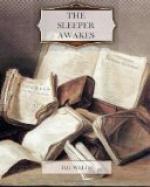He had slipped out between the contending parties into this liberty of the twilight. What would happen next? What was happening? He figured the red-clad men as busily hunting him, driving the black-badged revolutionists before them.
At any rate chance had given him a breathing space. He could lurk unchallenged by the passers-by, and watch the course of things. His eye followed up the intricate dim immensity of the twilight buildings, and it came to him as a thing infinitely wonderful, that above there the sun was rising, and the world was lit and glowing with the old familiar light of day. In a little while he had recovered his breath. His clothing had already dried upon him from the snow.
He wandered for miles along these twilight ways, speaking to no one, accosted by no one—a dark figure among dark figures—the coveted man out of the past, the inestimable unintentional owner of the world. Wherever there were lights or dense crowds, or exceptional excitement, he was afraid of recognition, and watched and turned back or went up and down by the middle stairways, into some transverse system of ways at a lower or higher level. And though he came on no more fighting, the whole city stirred with battle. Once he had to run to avoid a marching multitude of men that swept the street. Everyone abroad seemed involved. For the most part they were men, and they carried what he judged were weapons. It seemed as though the struggle was concentrated mainly in the quarter of the city from which he came. Ever and again a distant roaring, the remote suggestion of that conflict, reached his ears. Then his caution and his curiosity struggled together. But his caution prevailed, and he continued wandering away from the fighting—so far as he could judge. He went unmolested, unsuspected through the dark. After a time he ceased to hear even a remote echo of the battle, fewer and fewer people passed him, until at last the streets became deserted. The frontages of the buildings grew plain, and harsh; he seemed to have come to a district of vacant warehouses. Solitude crept upon him—his pace slackened.
He became aware of a growing fatigue. At times he would turn aside and sit down on one of the numerous benches of the upper ways. But a feverish restlessness, the knowledge of his vital implication in this struggle, would not let him rest in any place for long. Was the struggle on his behalf alone?
And then in a desolate place came the shock of an earthquake—a roaring and thundering—a mighty wind of cold air pouring through the city, the smash of glass, the slip and thud of falling masonry—a series of gigantic concussions. A mass of glass and ironwork fell from the remote roofs into the middle gallery, not a hundred yards away from him, and in the distance were shouts and running. He, too, was startled to an aimless activity, and ran first one way and then as aimlessly back.
A man came running towards him. His self-control returned. “What have they blown up?” asked the man breathlessly. “That was an explosion,” and before Graham could speak he had hurried on.




